COVID-19 isolation: How to sleep better while working from home
If corona-stress isn’t enough to keep you up at night, the fact that your home is now also your office, means the line between work and downtime is even more blurred. Here’s how to find the balance.
- COVID-19 financial help: Support payments you can access
- Food freezing mega guide: What you must know
As more Australians work from home and settle into self-isolation to help slow the spread of COVID-19, many of us are finding our quality of sleep and ability to nod off at night isn’t as good as it used to be.
And it’s understandable, given we’re settling into new routines and facing new challenges (anyone homeschooling, working remotely, dealing with recent job loss, supporting at-risk loved ones from afar, and missing friends and all sorts of things you enjoy — we see you). All this while coping with the heavy news cycle and adjusting to often-changing government guidelines. Phew!
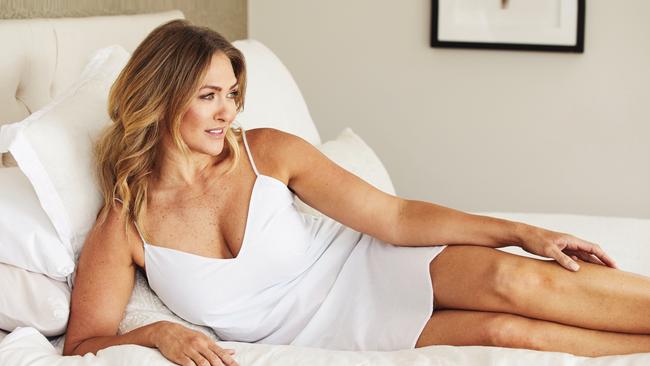
The importance of sleep shouldn’t be underestimated.
“The fact we spend a third of our entire lives asleep just hints at how critical it is for both our mental and physical wellbeing,” writes physician Dr Rangan Chatterjee in his book The 4 Pillar Plan.
MORE FROM BODY+SOUL:
body+soul LIVE @ home online workout series
9 protein facts that will give you a better body
Dr Chatterjee says the potential benefits of a good night’s sleep include increased energy, improved concentration and immune-system function, enhanced autophagy (the body’s ability to ‘spring-clean’ its systems) and reduced stress levels.
So if you feel your sleep has been suffering, help is at hand. We reached out to the experts to share their best tips to help you sleep more soundly at night …
DURING THE DAY
Stick to a schedule
When it comes to quality sleep, what you do during the day matters just as much as your evening routine.
“It’s important to support your body clock and daily rhythms,” says Professor Dorothy Bruck, a sleep psychologist and chair of the Sleep Health Foundation.
The brain’s master body clock, the suprachiasmatic nucleus, is guided by daily light.
To give it a kickstart, open your curtains within a few minutes of getting up in the morning so it immediately gets a powerful time signal.
Throughout the day, take breaks to sit near a window or step outside for a few moments to help your brain keep those circadian rhythms steady.
Have routine times for waking up and going to bed, too — and stick to them.
Eat breakfast
“If you’re feeling anxious, eat breakfast within 30 minutes of rising,” says Dr Nerina Ramlakhan, author of Fast Asleep, Wide Awake.
“Include a source of protein such as nuts, eggs or yoghurt. This will help your body to make the hormones of wellbeing and trust — serotonin and oxytocin — and then, later in the evening, melatonin.”
The Sleep Health Foundation recommends eating all meals around the same time each day.
“Eating serves as a time-keeper and helps tune your body clock, so eating meals at the same time each day supports a healthy biological clock, which is important for sleep.”
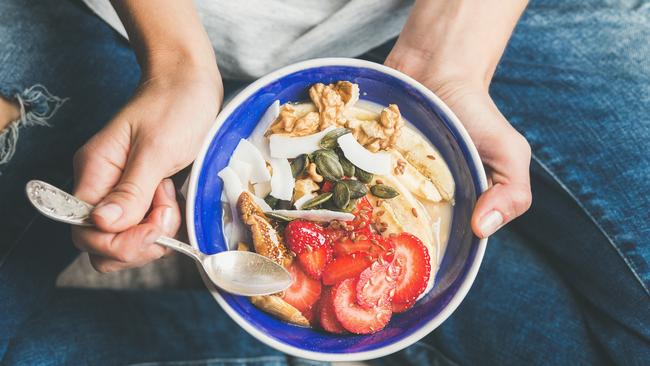
Try short bursts of exercise
Exercising has been directly linked to better sleep quality. Plus, a 2018 study by the University of Bath found that regular bouts of activity may also enhance immune competency.
Exercise, especially during this coronavirus crisis, will benefit both mental and physical wellbeing.
But don’t go overboard.
“It’s important to find balance with exercise, as in some instances excessive exercise can reduce your immune system for a period of time,” says exercise physiologist Stephanie Frade.
“Exercising in small regular bursts can be more effective than exerting yourself in one single session.”
Try doing a seven-minute workout three times during the day.
Connect with others
“Throughout the day, you need to make choices that enable you to live in the right part of your nervous system — living in the parasympathetic nervous system and not the flight-or-flight system,” says Dr Ramlakhan.
And connecting with others can help with this. Call a friend or have a Zoom session with someone you miss.
“Even a quick ‘hello’ and check-in is useful,” says Bruck.
“The other person will probably appreciate the human contact, too!”
Practising gratitude also helps, adds Dr Ramlakhan.
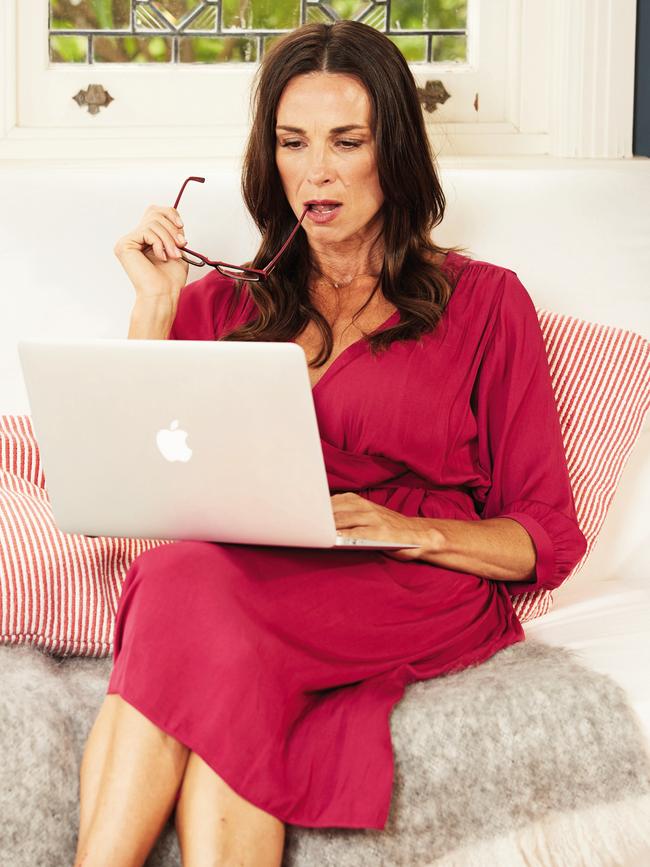
“You can either write this down or do it in your mind,” she says.
“What do you feel grateful for? What happened in your day that was good? Who are you grateful for even if you can’t see them at the moment? Imagine hugging them and sending them love — especially elderly relatives or friends you’re worried about.”
Clock off work
The Sleep Health Foundation recommends making time to unwind in the evening.
“Have strict guidelines around shutting off from work — and stick to them,” advises exercise physiologist Sam Rooney.
“If you’re lucky enough to have a dedicated home office, be strict in leaving it at a specific time to officially knock off work for the day.
“If you don’t have a work office, try to clear anything work-related away. I personally lock my laptop, work phone and any paperwork away in a drawer. Out of sight, out of mind.
“This should help you switch over to downtime and wind down for the evening.”
IN THE EVENING
Cut out ‘emotional commotion’
Between 90 minutes and two hours before bedtime should be the window when you wind down and start doing things that enhance the production of the sleep hormone melatonin.
“Managing your commotion means making it a cast-iron rule that you do not discuss emotive subjects in the evenings, crack on to a new work task, check your bank balance or do anything that’s going to set your mind working,” explains Dr Chatterjee.
Psychologist Jocelyn Brewer agrees.
“Coronavirus panic itself is contagious — the brain tends to resonate more with negative emotions more than the positive — and this does not make for a bedtime lullaby!” she says.
“To further protect your sleep and sleep zones from a tsunami of information and images before you go to bed, get off social media and don’t try to read all of the news.”
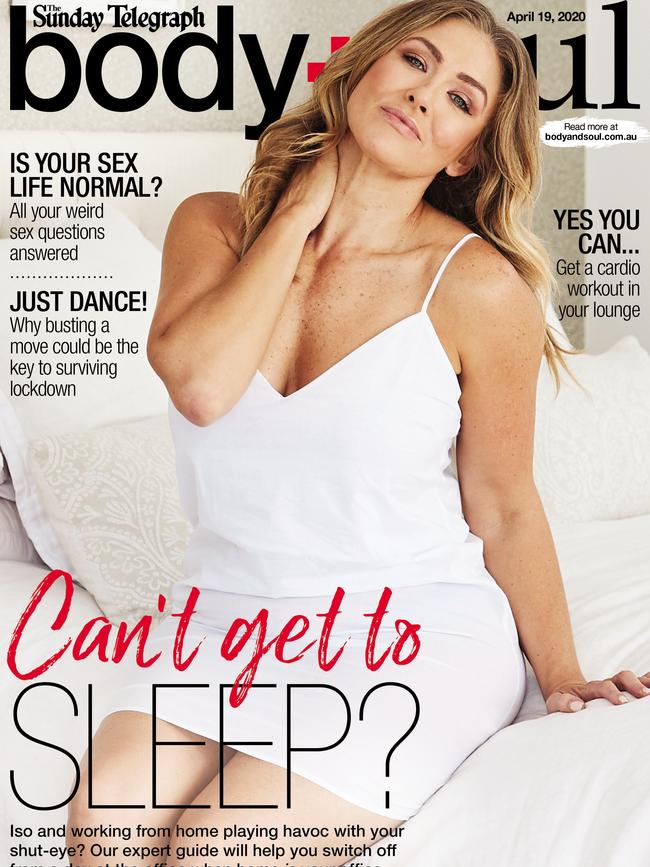
Give journalling a go
This can be a useful relaxation tool for evenings or late at night.
“If you take more than 30 minutes to nod off, I suggest getting up and journalling,” says Brewer.
“Take two pieces of paper — one for noting down the good stuff that comes up, things to do or actions to take; and the other for the fears, worries and extraneous ideas rolling around in your head.”
Once you have ‘downloaded’ everything you need to on to the pieces of paper, Brewer recommends ripping up the page of the negative stuff and keeping the positive page of reflections and actions so your focus is turned to the things you can control.
Put fatigue in perspective
If you’ve had a bad sleep the night before, know you’ll get through the next day OK. Find comfort in the thought that waking during the night is normal and that if one poor night’s sleep has left you feeling tired, you may well sleep better the following night to make up for it.
You can’t force sleep to come to you.
“Sleep is like a butterfly,” says Bruck.
“It’s almost impossible to reach out and grab it and catch it, but if you stay quiet and still, the butterfly will come to you.”
AT NIGHT
Switch from light to dark
Dr Chatterjee’s number-one tip to setting the scene for a good night’s rest is to make sure your room is well and truly dark.
“Darkness is a signal to your body that it’s time to rest. It triggers the production of melatonin, which is the hormone that’s largely responsible for helping us to go to sleep.”
Use a red light
If you require a light source once you’ve hit the hay, Dr Chatterjee recommends investing in a red light.
“Red is the wavelength that has the least impact on your body’s circadian clock,” he explains.
A pair of amber glasses can also help reduce the effect blue light from smartphones and computers can have on your ability to nod off. Both options are readily available online.
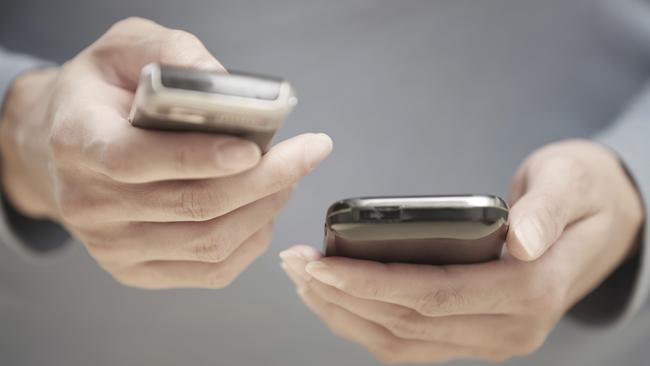
Relax your muscles
Give progressive muscle relaxation a try.
“It’s about focusing on releasing the stress you store in your muscles,” explains psychologist Monique Beglinger.
“Squeeze and release the muscles in your body one at a time, starting from your feet and working your way up your body all the way to your eyebrows.”
You may even nod off before you get to your elbows.
Try ‘havening’
If you feel anxious or have trouble sleeping, Dr Ramlakhan recommends trying the havening exercise.
“Place your right hand on your upper left arm and left hand on your upper right arm so they’re crossed in front of your chest,” she explains.
“Rub your hands up and down your arms slowly while repeating, ‘I am safe, I am safe in my body, I am safe to rest, I am safe to sleep.’ Do this for at least three minutes.”
This should help you shift from the fight-or-flight to the parasympathetic nervous system, responsible for rest, repair, digestion, immunity and restorative sleep.
Here’s to a good night’s rest!
